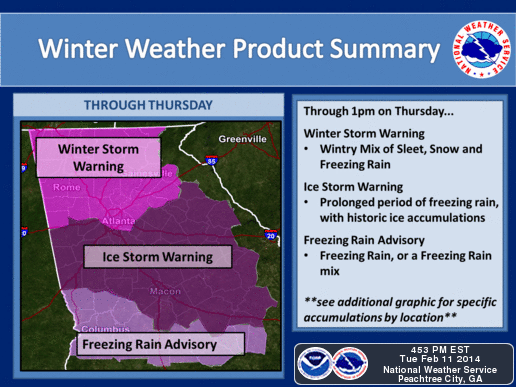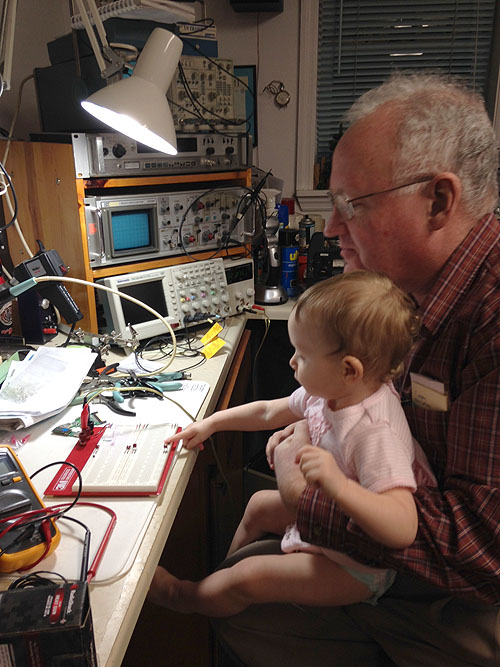2014
February
27-28
|
Panic and paranoia are not my hobby
[Updated.]
Have you noticed how many people seem to have settled into a lifestyle
of permanent panic, fueled by inflammatory news media and the Internet?
This article
describes a case
(although I think the article gives Fox too much credit;
the poor gentleman was surely in touch with more extreme panic-mongers
through the Web or other media). Chronic panic is common, and I refuse to be drawn into it.
Some things to watch out for are:
- Media that often report just one side of a controversy, especially lawsuits that haven't gone to trial.
- The attitude that only a few news sources are to be believed — the rest are lying or concealing things.
- A compulsion to "spread the word" on Facebook and other forums. Some people on Facebook say nothing of their
own — they just copy-and-repost or share links. In my experience, information that travels
through "pass it on" or "copy and repost" is false 99.9% of the time.
- The feeling that every issue is a moral issue and that civilization will collapse if the wrong side wins.
- Above all, the notion that everyone has a duty to pay attention to this issue right now
or something terrible will happen.
The term "culture war" is often used. Well, yes, there is a constant struggle between good and evil in our culture.
But not every little dispute is part of it. I am not one of those who feel that every little opinion of mine is the
will of God, and every opinion contrary to it must be straight from the devil. Sometimes opinions are just opinions.
When morality is perfectly clear, we can still differ about what will actually happen if a policy is adopted,
or even whether the background facts have been gathered adequately.
Anyhow, when one has a moral conviction, often the right thing to do is hold it, firmly and quietly,
rather than chattering constantly and trying to debate everyone, or (worse) shunning everyone who doesn't agree.
It is not my job to pay attention immediately to everything that anybody on Fox, CNN, or Facebook
tells me to. I run my own mind — they don't. I won't let other people keep me in a state of
panic and exhaustion with one artificial crisis after another. We weren't killed off by race riots in 1960,
nuclear war in 1975, an environmental crisis in 1990, or the recession in 2008. Calamities commonly fail to happen
as predicted.
I think part of what's going on is psychological — some people get undue enjoyment from making themselves
and others panic. In fact, some people are attached to the emotion that comes from dire warnings that they
don't even actually believe. Have you seen people circulating warnings on Facebook and not acting upon
them themselves? It's common. It's unhealthy. Personally, I don't want my emotions to be out of sync with
my knowledge and beliefs.
As for actually making the world a better place, you're not much help unless you understand an issue
deeply, and that means not all issues are your job. Superficial panic about 1000 things that you don't really
understand isn't going to do anybody any good. Stick with a few things that you do understand, and leave the
rest to others.
And avoid an excessive diet of panicky media even if it means being less accessible to your friends.
(I thank Ron Wodaski for the link to the Salon article.)
Permanent link to this entry


|
2014
February
23-26
|
Here comes Bayesian science
An important shift in scientific method has been taking place,
in many different fields of study, over the past twenty years
or more. It's based on Bayesian reasoning and
Bayesian statistics, by which we mean an approach to
statistics derived from a theorem
that was formulated by Rev. Thomas Bayes (1701-1761).
One of the most obvious uses of Bayes' Theorem is in medical diagnosis,
so that's where I'll start. Suppose you have a patient with a headache.
Headaches can be caused by brain tumors. How likely is it that your patient
has a brain tumor? It depends on:
- How common headaches are;
- How common brain tumors are; and
- How often a brain tumor produces a headache.
The hypothesis H is that the patient has a brain tumor.
The evidence E is the headache.
We want to find the probability of H given E,
which is written P(H|E).
To find it, we need to know the three things I just mentioned,
which are P(E) (probability of a headache),
P(H) (probability of a brain tumor),
and P(E|H) (probability of a headache
given a brain tumor). The formula is:

(Sorry if I've confused you. Note that in my example, H stands
for Hypothesis, not for Headache. The headache is E, the Evidence.)
So if headaches are really common, and brain tumors are rare,
Bayes' Theorem tells us that a headache is not a very strong sign
of a brain tumor.
In the past I wrote about classical statistics.
Bayesian statistics is different. In classical statistics, an
experiment stands alone, and you use it to test whether a
hypothesis is true. In Bayesian statistics, you use successive experiments
to adjust your estimate of the probability that the
hypothesis is true. That is, you start with an estimate
of P(H) (which could even be that P(H) is totally unknown,
but need not be), and you use the evidence to adjust your estimate
so that it fits the evidence better.
This requires mathematics that goes beyond Bayes' Theorem, of course, but
is closely derived from it. Crucially, you normally start with a
distribution of possible values of P(H), not just
a single value, and you adjust this distribution to be more compatible
with the evidence. If P(H) is totally unknown, the
distribution is flat (all values are considered equally likely until the evidence
tells you that they're not).
The estimate of P(H) or the estimated distribution of P(H)
is called the prior.
That's enough mathematics. I'd like to focus on some practical and philosophical
consequences of using Bayesian statistics.
First: Bayes' Theorem is not the least bit controversial. It definitely does
what it says it does. It's easy to re-derive from simple probability theory.
In fact, for a while, I had to do this every time I used the formula, which I
had trouble memorizing.
Second: "Probability" in Bayesian reasoning means more than just relative
frequency. We are not looking at experiments carried out over and over like
coin flips. Bayesian probability is more like degree of belief — not just
a subjective feeling, but something subject to mathematical consistency.
Roughly, a probability of 1/4 means that you know you are in one of four
different situations, none of which is more likely than the others, and you
can't tell which one, but the hypothesis is only true in one of them.
It's rather like saying the probability that a coin is
lying face-up is 1/2 before you look at it.
Third: Unlike classical statistics, Bayesian statistics models the gradual
growth of knowledge. In classical statistics, every experiment is considered
perfect and stands in isolation, unless it is so identical to another experiment
that they can be combined. Its purpose is to yield a yes-no answer.
The answer cannot be any more informative than the hypothesis. Ask a stupid
question, get a stupid answer. In Bayesian statistics, the answer can be more
than yes or no; it can be something you genuinely didn't foresee.
In fact, Bayesian statistics doesn't work if you're closed-minded.
If P(H) is exactly 0 or exactly 1,
P(H|E) will be the same; the evidence has no effect
on it. So if you actually want to know anything, you have to assume
that P(H) is at least a smidgeon greater than 0 and at
least a smidgeon less than 1. This is called Cromwell's rule
("I beseech you...think it possible that you may be mistaken," Oliver Cromwell, 1650).
(In detail: If P(H) = 0 then, obviously, the whole formula comes out zero.
If P(H) = 1, then P(E|H) = P(E) and
the whole formula comes out 1.)
Fourth: Bayesian statistics strikes a balance between extreme empiricism
and postmodernism. The empiricist says the mind is a blank slate and we
learn from evidence. The postmodernist says that the mind is so enslaved to
its preconceptions that we can never learn anything objectively true.
The Bayesian says the mind has preconceptions but evidence can force them to
be altered to almost any extent.
The graphical rendition of Bayes' formula is from Wikipedia.
Permanent link to this entry


|
2014
February
21-22
|
Untrustworthy calculator

I've heard scattered stories about bugs in calculator apps for
smartphones and tablets, and the other day I actually encountered one.
I was using Calculator• for iPhone, an older app that I bought
back in my iPod days. It's in the App Store
but the vendor's web site appears to be down. I have the current version (5.1.1).
I punched in 1 divided by 2.97 and got what you see above, about 0.214.
The correct answer is about 0.337.
I am somewhat at a loss as to exactly what programming error they made. (Maybe some
mathematically inclined reader can figure it out!) But what if I hadn't
noticed?
Calculators are normally very reliable for many reasons. Many of them
are built around hardware that is designed for nothing else. But I keep
hearing that calculator apps for portable devices — that is,
calculators that consist of software — are substantially less reliable.
The App Store page for this calculator mentions previous bug fixes to
correct other incorrect results. To which I say:
If the software haphazardly outputs
the wrong numbers under obscure conditions, it's badly designed.
Why does the Apple community tolerate any calculators with any
known errors? A calculator is simple. It should work.
I bought this calculator app back when one wasn't bundled with iOS.
Now there is one, and I have switched to it. I also use Pcalc Lite, which is a free
preview of a commercial scientific calculator app.
But should I trust any of them?
Permanent link to this entry


|
2014
February
20
|
What I said on Facebook
In response to a correspondent who was offended by my open advocacy of Christianity on my
personal Facebook page, I posted the following message, which is, I think, my most popular
Facebook posting ever. I have made one small improvement to the wording before posting it
here:
Permanent link to this entry


|
2014
February
16-19
|
The "couponing" racket
Can't live with 'em, can't live without 'em. I'm talking about grocery store
coupons, with which Americans have been inundated since the start of the Great
Recession. Sometimes the savings are quite substantial. The labor of organizing
the coupons, however, has become substantial.
People tell me how much money they save by "couponing." I reply:
"Couponing" is not productive economic activity. It is a game the
merchants are making you play. It may be to your benefit to play it,
but only because they artificially created it.
I would much rather just have competitive low prices, without coupons.
Permanent link to this entry


|
2014
February
15
(Extra)
|
Earthquake
For the first time in my life I have experienced an earthquake as more than a vague rumble.
A couple of times in the past, I have heard rumblings and found out later that they were
earthquakes. This one, however, was obvious.
On the evening of February 14, I was sitting at the breakfast table, surfing the
Internet with my laptop computer. The house suddenly shook in an east-west
direction; in fact, the wave seemed to enter the house on the west and travel
to the east (opposite its real direction of travel; this may
have been an illusion). There was little or
no noise audible inside the house,
and the whole event lasted less than five seconds. The shaking was much
slower than the usual "truck-rumbling" earthquake. It was like one or two cycles of a
sine wave at maybe 2 Hz.
I immediately looked up at the clock, which read 10:24 p.m. but turned out to be about one minute
fast. At first I thought it had been an unusual wind gust, but it did not persist
(and in fact the weather station is reporting little wind at present).
I thought a tree might have fallen, but there was no thud.
Then I thought it might have been an ice sheet coming off the roof, so
I went outside but could not identify a place where that could have happened.
(Most of our snow and ice has melted.) Then I saw that friends were posting on Facebook
about a possible earthquake, and on the police scanner, I heard a few reports of the
ground shaking.
Curiously, the dogs didn't react.
The U.S. Geological Survey confirms a 4.1-magnitude earthquake 7 miles WNW of Edgefield,
South Carolina (about 23 miles north of Augusta, Georgia), centered 2.9 miles below
the surface. Event page here.
Permanent link to this entry


|
2014
February
12-14
|
After snow
We survived, confined to the house more than 48 hours, and nearly so for four days total.
The power stayed on, the Internet kept working, I kept working,
and the granddaughter kept entertaining us.
The problem was not snow but ice, a heavy accumulation of ice on roads and on cars and
buildings. Sheets of ice are sliding off buildings and cars today and doing damage.
[Addendum:] It has been pointed out that a big difference between this week's
snowstorm and the one two weeks earlier is that this time, the snow started at
night, when people were at home. Two weeks ago, it started during the day,
when people were at work and school. The same is true of Snowjam 1982.
The Oconee County Sheriff, as a joke, announced that St. Valentine's Day was
cancelled due to the storm. National news picked it up, and now he's getting
hate mail from all over the country. Some are saying it makes Georgians look
ignorant. Even if it weren't a joke, it wouldn't be ignorant: St. Valentine's Day
is a human celebration, not a physical event, and human beings can perfectly well
change the date of it.

Happy Valentine's Day, Melody, Cathy, Sharon, and Mary!
Permanent link to this entry


|
2014
February
10-11
|
Snow #2

Two weeks ago, our "snowjam" was a mild snowstorm with some ice, coupled with
Atlanta's notorious inability to handle its own traffic even under the best
of conditions.
Now we're having something worse. The University of Georgia took the unprecedented
step of announcing on the evening of Feb. 10 that it would be closed on the 11th.
(Such announcements are normally made early on the morning of the day of closure.)
The National Weather Service is using language it has never used before — we
had a winter storm warning, superseded by an ice storm warning. Today (the 11th)
we have only had some snow and rain, but tonight, ice is going to start condensing
on trees, power lines, and pavement. It should be exciting. Especially with
Cathy, Nathaniel, and baby Mary here for a visit!
Permanent link to this entry


|
2014
February
8-9
|
Lisp Machine "Space-Cadet Keyboard"
Back in the 1980s, the Institute for Artificial Intelligence
(or rather its predecessor, the Advanced Computational Methods Center)
had three LMI Lisp machines housed in a single box.
These were special-purpose minicomputers, programmed in Lisp and
designed, from the CPU up, for object-oriented programming.
(Almost all present-day CPUs are designed for something very much like the C language,
which is not object-oriented.)
The keyboard of the Lisp machine was quite a sight. Here's what it looked like:
|
2014
February
6-7
|
Start of an avalanche
The CVS pharmacy chain has announced plan to stop selling tobacco products.
I think this was a wise decision, and I also think it's the start of an
avalanche.
The reason is, there are indications that they have economic motives,
not just a concern for health. They're just not selling as many
cigarettes as they used to, and they'd rather do something more profitable
with the same amount of space and labor.
That doesn't make their decision any less virtuous, of course.
But it does mean that a lot of other merchants may quickly follow suit.
This may be the hot new trend of 2014.
Permanent link to this entry


|
2014
February
1-5
|
The Anthropic Principle
One of the least satisfying parts of present-day cosmology, to me, is an assertion
called the Anthropic Principle.
It's supposed to explain why the universe is able to support intelligent life.
After all, if any of several fundamental physical constants were even slightly
different, we couldn't have existed. Everything would be either too hot
and gaseous or too cold and inert, or in some other way, the conditions necessary
for life (and other complex chemistry) would not be met.
The Anthropic Principle says: The universe has to support intelligent life, because
if it didn't, we wouldn't be here to observe it.
I think that is trivially true but not much of an explanation. Here is an analogy.
The other day I lost my jacket, and then I eventually found it at the gymnasium
where I exercise.
A reasonable person might ask why my jacket was at the gym.
A satisfying answer would be that I left it there the previous day.
But an answer in the style of the Anthropic Principle would be this:
The jacket had to be at the gym because that's where I was looking when I found it.
Not very satisfying, is it?
Permanent link to this entry
Ham and Rye, er, Nye
I didn't watch the debate between Ken Ham and Bill Nye about young-earth creationism.
Others tell me that the two sides didn't really engage — it was more of an
exchange of assertions. But I'm glad to hear that Mr. Nye pointed out that numerous
Christian believers are not young-earthers; and Mr. Ham pointed out that a correct
opinion about the age of the earth is not necessary for salvation.
I was, of course, questioned by lots of people immediately after the debate, and I
want to make two observations.
First: Non-Christians may not realize that the Bible is far from clear about the age
of the earth. There is no Bible verse that says how old the earth is. Jesus and the
Apostles are never quoted as saying "Four thousand years ago, when the
earth was created..." or anything like that. Quite a bit of calculation is needed
to extract an age of the earth from the Bible, and you have to assume that the
numbers you're adding up are complete and are intended to be used that way.
Second: I've seen two styles of thinking. One of them, which is mine, is to weigh
evidence and say after a while that one alternative seems more likely than the other.
The other style of thinking is to demand The Answer Right Now and not tolerate any
further questioning.
Permanent link to this entry


|
|
|
This is a private web page,
not hosted or sponsored by the University of Georgia.
Copyright 2014 Michael A. Covington.
Caching by search engines is permitted.
To go to the latest entry every day, bookmark
http://www.covingtoninnovations.com/michael/blog/Default.asp
and if you get the previous month, tell your browser to refresh.
Entries are most often uploaded around 0000 UT on the date given, which is the previous
evening in the United States. When I'm busy, entries are generally shorter and are
uploaded as much as a whole day in advance.
Minor corrections are often uploaded the following day. If you see a minor error,
please look again a day later to see if it has been corrected.
In compliance with U.S. FTC guidelines,
I am glad to point out that unless explicitly
indicated, I do not receive substantial payments, free merchandise, or other remuneration
for reviewing or mentioning products on this web site.
Any remuneration valued at more than about $10 will always be mentioned here,
and in any case my writing about products and dealers is always truthful.
Reviewed
products are usually things I purchased for my own use, or occasionally items
lent to me briefly by manufacturers and described as such.
I am an Amazon Associate, and almost all of my links to Amazon.com pay me a commission
if you make a purchase. This of course does not determine which items I recommend, since
I can get a commission on anything they sell.
|
|









